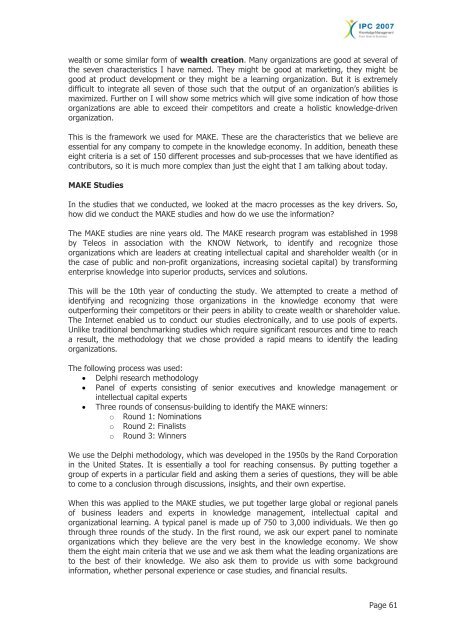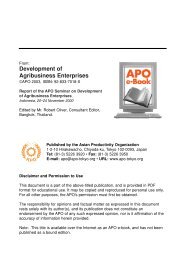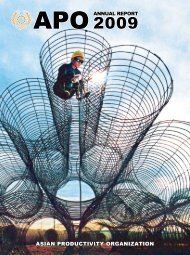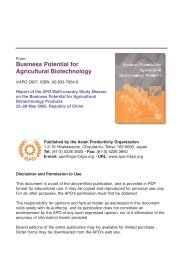Knowledge Management: From Brain to Business (PDF 5.5 - Asian ...
Knowledge Management: From Brain to Business (PDF 5.5 - Asian ...
Knowledge Management: From Brain to Business (PDF 5.5 - Asian ...
Create successful ePaper yourself
Turn your PDF publications into a flip-book with our unique Google optimized e-Paper software.
wealth or some similar form of wealth creation. Many organizations are good at several of<br />
the seven characteristics I have named. They might be good at marketing, they might be<br />
good at product development or they might be a learning organization. But it is extremely<br />
difficult <strong>to</strong> integrate all seven of those such that the output of an organization’s abilities is<br />
maximized. Further on I will show some metrics which will give some indication of how those<br />
organizations are able <strong>to</strong> exceed their competi<strong>to</strong>rs and create a holistic knowledge-driven<br />
organization.<br />
This is the framework we used for MAKE. These are the characteristics that we believe are<br />
essential for any company <strong>to</strong> compete in the knowledge economy. In addition, beneath these<br />
eight criteria is a set of 150 different processes and sub-processes that we have identified as<br />
contribu<strong>to</strong>rs, so it is much more complex than just the eight that I am talking about <strong>to</strong>day.<br />
MAKE Studies<br />
In the studies that we conducted, we looked at the macro processes as the key drivers. So,<br />
how did we conduct the MAKE studies and how do we use the information?<br />
The MAKE studies are nine years old. The MAKE research program was established in 1998<br />
by Teleos in association with the KNOW Network, <strong>to</strong> identify and recognize those<br />
organizations which are leaders at creating intellectual capital and shareholder wealth (or in<br />
the case of public and non-profit organizations, increasing societal capital) by transforming<br />
enterprise knowledge in<strong>to</strong> superior products, services and solutions.<br />
This will be the 10th year of conducting the study. We attempted <strong>to</strong> create a method of<br />
identifying and recognizing those organizations in the knowledge economy that were<br />
outperforming their competi<strong>to</strong>rs or their peers in ability <strong>to</strong> create wealth or shareholder value.<br />
The Internet enabled us <strong>to</strong> conduct our studies electronically, and <strong>to</strong> use pools of experts.<br />
Unlike traditional benchmarking studies which require significant resources and time <strong>to</strong> reach<br />
a result, the methodology that we chose provided a rapid means <strong>to</strong> identify the leading<br />
organizations.<br />
The following process was used:<br />
• Delphi research methodology<br />
• Panel of experts consisting of senior executives and knowledge management or<br />
intellectual capital experts<br />
• Three rounds of consensus-building <strong>to</strong> identify the MAKE winners:<br />
o Round 1: Nominations<br />
o Round 2: Finalists<br />
o Round 3: Winners<br />
We use the Delphi methodology, which was developed in the 1950s by the Rand Corporation<br />
in the United States. It is essentially a <strong>to</strong>ol for reaching consensus. By putting <strong>to</strong>gether a<br />
group of experts in a particular field and asking them a series of questions, they will be able<br />
<strong>to</strong> come <strong>to</strong> a conclusion through discussions, insights, and their own expertise.<br />
When this was applied <strong>to</strong> the MAKE studies, we put <strong>to</strong>gether large global or regional panels<br />
of business leaders and experts in knowledge management, intellectual capital and<br />
organizational learning. A typical panel is made up of 750 <strong>to</strong> 3,000 individuals. We then go<br />
through three rounds of the study. In the first round, we ask our expert panel <strong>to</strong> nominate<br />
organizations which they believe are the very best in the knowledge economy. We show<br />
them the eight main criteria that we use and we ask them what the leading organizations are<br />
<strong>to</strong> the best of their knowledge. We also ask them <strong>to</strong> provide us with some background<br />
information, whether personal experience or case studies, and financial results.<br />
Page 61
















